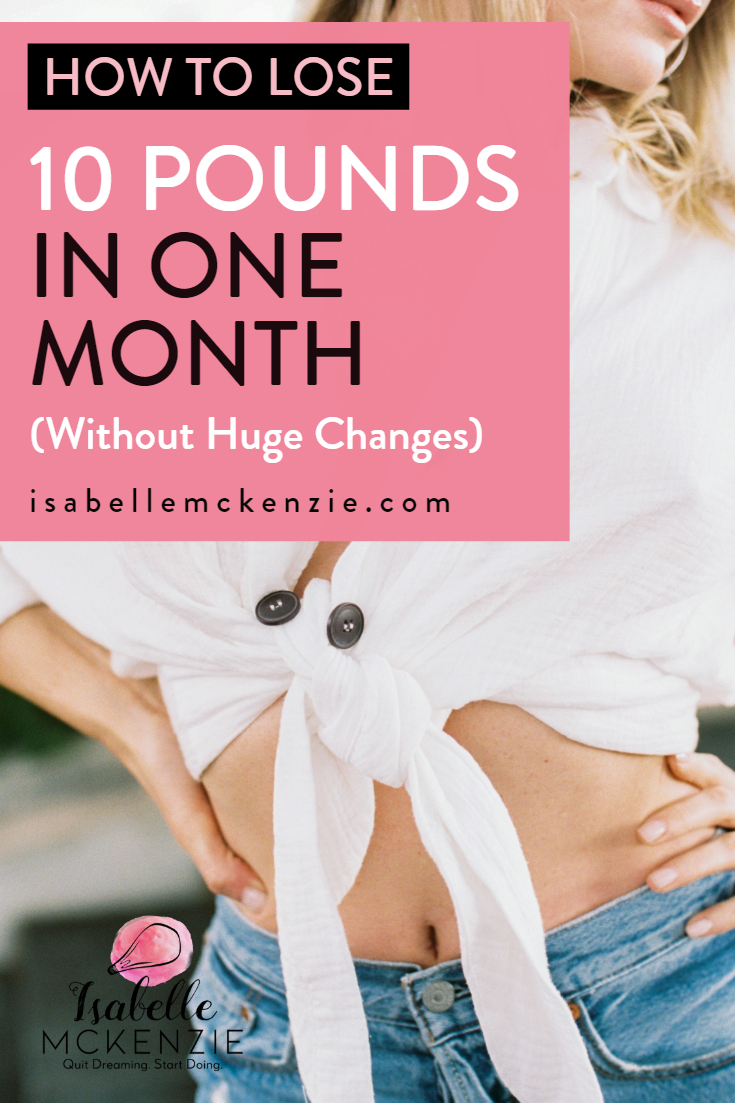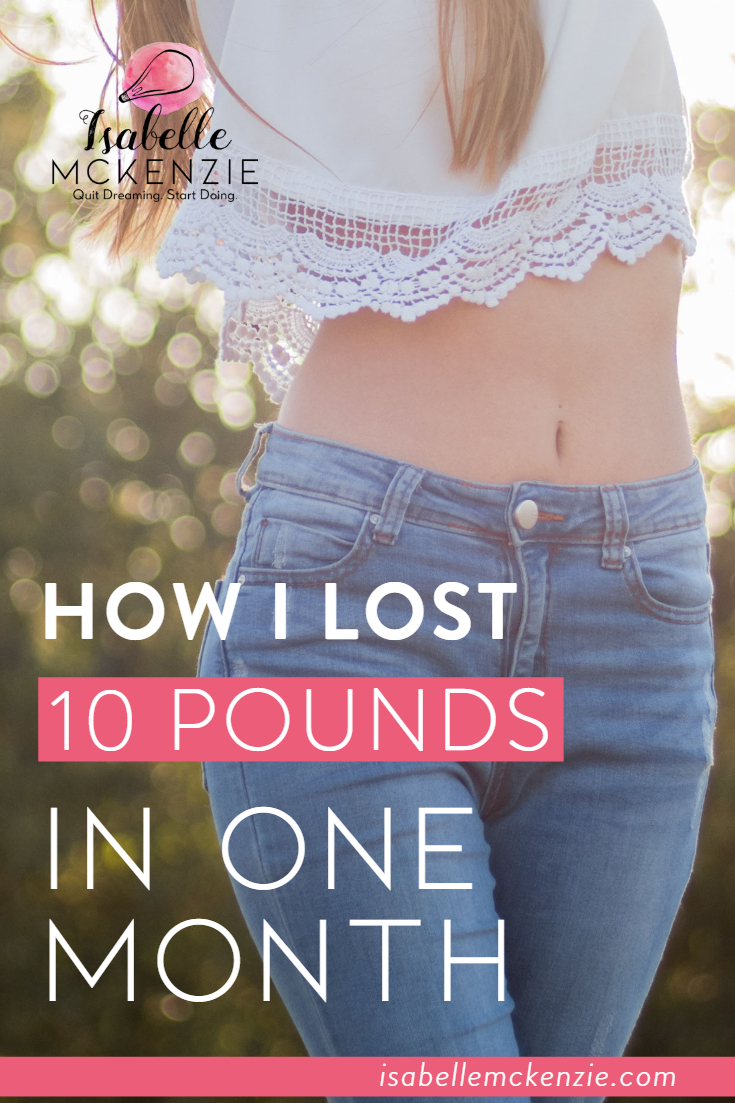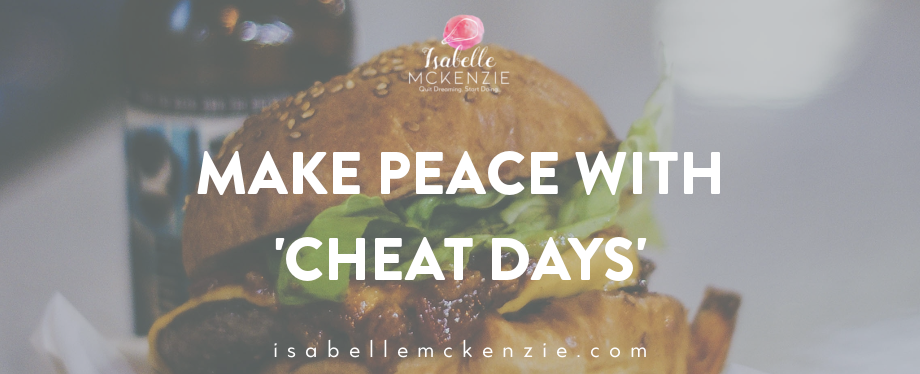How I Lost My First 10 Pounds (In Under 30 Days)
How I Lost My First 10 Pounds (In Under 30 Days)
By far, these have been the most positive and useful changes I have made in my entire weight-loss journey. They are simple and effective methods that have worked for me, and I know they can work for you too!
I’ve been struggling with weight issues for the past 5 years. When I was 14, I started gaining weight.
I had always been a slender child with a fast metabolism, but when I got to my early teen years I started to notice a change. At 5'7, I had gone all the way up to 140lbs. At first, I was in a total panic.
I had no idea when it started or why (I didn’t really take much notice of regular weigh-ins), just that one day I’d decided to step on the scale and noticed a 20 or so pound gain.
My diet which really could have been better, combined with hormone problems (which I still suffer from today) had totally wreaked havoc on my body.
I didn’t make any diet plan or anything, but I decided to limit my carb intake and stop having seconds, but it did the trick. I didn’t weigh myself after that first time (the household scale was broken) but I got from a size 6-7 back to a 3, in roughly 2 years. However, that wasn’t the end of it.
My real problems started when I injured my ankle at 17.
I couldn’t work out every day like I had been, and it threw me into some bad habits, both mentally and physically. I would freak out and feel like I was going to gain 100 pounds, eat less than I should have, and then eat too much to make up for it.
This cycle continued and continued until my bad eating habits led me to gain back every single pound I had previously lost (and then some).
I was devastated, and this just put me into a terrible frame of mind. I felt insecure, lost, and sometimes hopeless. I tried cutting back on my food intake the way I had at 14, but nothing changed. I tried other diets I found online, but nothing changed. This, combined with my injury, led me to develop a terrible relationship with food, and almost a kind of depression.
Thankfully, with the help of my mum, I managed to work past the mental side of my problems, with seemingly endless hours talking it through (my poor mum 😉) but I still couldn’t quite get the grasp on the food side of things.
I messed about with various methods for another year, and fast forwarding to a few months ago, I finally created a food system that worked for me.
My new diet, combined with a few good tools and hacks, got me on the course to finally losing weight. In my first 30 days I managed to use 11 pounds!
Now, don’t get me wrong, there were smaller loss months (I’m not perfect) and larger loss months, but here’s how I did it!
I created a low-calorie but balanced diet.
The first thing I knew to do was to cut calories. I’d done it before and it seemed to work, and after all calories eaten < calories burned = less weight. It seemed simple enough, but what I’d been failing to realise is that the type of calories you eat contribute to your results in a big way. After a bit of research, I found that even eating large amounts of fruit could impact your weight negatively.
After that I focused on incorporating more protein into my diet, and cutting down on fruit and healthy carb (rice, quinoa, etc.). I was already eating lots of veggies so I didn’t have to make much of an adjustment to that side of things. Instead, I would eat more clean proteins like boiled eggs and cottage cheese.
Eventually, I worked this new ratio into a full weekly recipe plan for breakfast, lunch, and dinner. This change has worked for me really well, and I even made it into a full 3-week meal plan. It’s called Lose Inches in an Instant, and if you’re interested on checking it out, you can do that here. If it helped me lose roughly 11 pounds in under a month, I can’t wait to see how it helps you!
Next up: I kept accountable.
You need to keep a food/workout diary, or an online tracker. Like I said before, the first time I lost weight I did it kind of haphazardly. I didn’t track anything I ate or what workouts I did, I just made it up as I went along. Somehow it worked for me then, but when I went to use this method again, not so much.
One of the things that has dramatically helped my progress is actually tracking everything that I do. Even though I’m following a diet plan, I still write down what I eat. I find that it helps to serve as an awesome deterrent if I’m tempted to eat something outside of that plan. Having to go back and look at the fact that I broke off from my diet is really something that I don’t want to do.
The same goes for my workouts. When I’m tempted to skip, I can go and look back at my last break day. If I only had a break two days before, then I go over the pros and cons of skipping another workout in such close proximity. The logical conclusion I come to usually motivates me to get on with starting my workout.
I started saying ’I don’t’, not ‘I can’t’.
I first tried this out after doing a bit of online reading. I read numerous articles on mindset and goal attainment, and one by one they all mentioned at one point or another that saying ‘I don’t’ is so much more effective on your mindset than saying ‘no’ or ‘I can’t’.
It’s actually really worked for me, especially when I need to keep motivated. When I find myself wanting to eat a bag of pretzels or skip my after-work out stretch, all I have to do is tell myself that “I don’t eat unhealthy carbs” or “I don’t skip stretches”. Saying ‘don’t’ just gives me a sense of not having a choice in the matter. It makes me feel as if it’s not “me” to do those things.
If I tell myself “I can’t”, then that negative usually spurs me to want to do the exact opposite, to rebel.
I focused on the journey, not the end goal.
This is one of the most important changes for me. I accepted that my end goal weight wasn’t going to reached in just a few weeks. It took me time to put it on, so it would take me time to get it off again. Getting myself over feeling frustrated and upset that I had a bad week isn’t going to get me anywhere. I might lose three pounds one week, and zero the next, and I had to make peace with that.
I found that when I didn’t obsess over my weight loss 24/7, I was actually more successful with my results. And if one week I don’t lose anything, I ask myself this: if I was at my goal weight, would I stop eating healthily and working out? My answer to this has always been no, and that keeps me focused and motivated on living in the now.
As long as I’m doing the right things, the scale only has one place to go, no matter how long it takes, and that’s down.
I got moving after meals.
I started incorporating at least 20 minutes of activity to my plan directly after eating. It could be something as simple as doing the dishes, to taking a 20-minute walk. This small bit of activity just helps to ensure that the food I eat is not converted directly into fat, but more into muscle.
I embraced the scale.
I know that sometimes frequent weighing can be looked down upon, but I really think applies to a longer term diet/workout system. I needed to be able to keep a careful note of what I’m doing and how it affects my daily weight standing.
Now, I’m not saying that you should weigh yourself every day, because I am aware that it can lead to an unhealthy obsession which will negatively affect your results, but you should keep a note several times a week at least.
One way to avoid taking on a frustrated mindset is to get someone else to weigh you daily. I actually have my mum do this sometimes.
I’ll just step on the scale and my mum will look instead of me, simple as that. This way I can look over all of my stats the next week and compare them with my food and workouts, but also avoid spending a daily fixating on a bad weigh-in.
I made peace with ‘cheat days’.
I realised that no matter how much I want to lose weight, there are going to be days where I just don’t care. There will be days where I’ll want to throw in the towel and eat a whole cheesecake, and that’s okay. It’s normal.
But the way I’ve learned to combat this is to actually let myself have a ‘cheat’ (or ‘treat’ as I like to call them).
I just have to do it in a smart way. For example, instead of letting myself eat a whole cheesecake, I’ll cut myself one or two cubes. Another good idea would to be to eat a piece or two of chocolate after dinner with a cup of coffee. I find this helps me not feel so restricted, but to do so in a way where I’m not taking in a huge amount of calories.
I kept my workouts consistent.
I set up a 7-day workout schedule, and I kept to it. I didn’t worry unduly about my performance in every single workout (we all have our good days and our bad) but the fact that I was staying active at least 5 days a week consistently just made that extra tad of difference.
By forgiving myself for feeling tired or slow during a workout, I allowed myself to feel less intimidated by the time it came round to me having to do that workout again.
This is what led to my increased consistency, and better weight loss. Another thing I tried was working out on an empty stomach. I found this method allowed me (with practice) to use energy more efficiently, and run on the calories I was storing instead of calories recently eaten.
I started fasting.
Well, not really. I have actually been practicing fasts since October last year. What I actually did was start to fast smarter. Before I had been fasting from late night snack to dinnertime, once or twice a week, and that had its benefits, but it would often lead me to crave bad-for-you foods and binge more on ‘my days off’.
However, I had seen some positive results on the days I decided to fast, like less bloating feelings and more efficient energy usage during my workouts. So, what I did was I changed my fasting period to a shorter amount of time and did them more frequently (1/2 of the time). I started incorporating breakfast into my fasting routine and instead skipping lunch. Then I would finish with dinner at around 6:30.
The extra protein in the mornings help carry me through the day, and the extra nutrition reduce my cravings, but the restricted lunch time eating still allows me to reap the benefits of longer period fasting.
I got my family to join in.
Last, but not least, I got my family members to join in and support me. Like I mentioned before, my mum had been helping me with measurements and motivation, but she also started following the same routine as me.
Together, we keep track of our diets, our workouts, and our weights, comparing what’s worked and what hasn’t. We give each other moral support, and help each other keep our discipline in line when we have a bad day.
By far, this has been the most positive and useful change I have made in my entire weight-loss journey. Not only has it helped us with furthering along our goals, but we’ve grown closer as friends too. Having that extra responsibility of not letting someone else down has been a huge motivator to stay strict and focused, and it’s also made my experience so much more fun, and it’s been beneficial for my mum too. She’s also lost more than 13 pounds to date!














